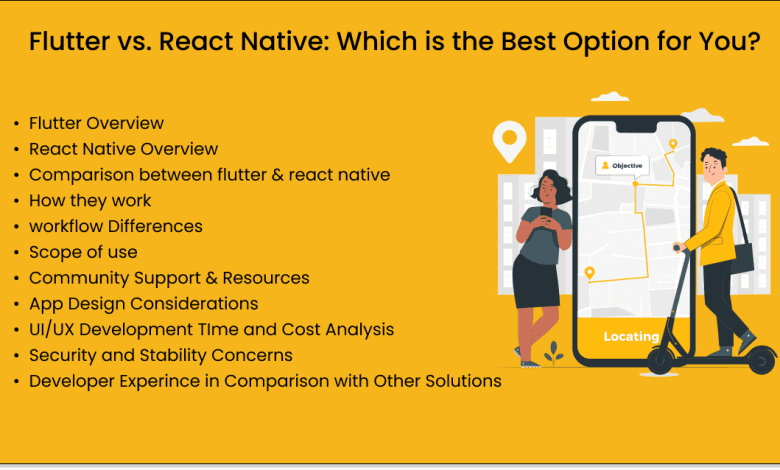Flutter vs React Native: Which is the Best Option for You?

React Native has taken the mobile app development world by storm in recent years, emerging as one of the most popular frameworks to build apps. It wasn’t long before Google launched Flutter in order to outdo it. Although each of these two frameworks offers advantages that you might find useful, they also have disadvantages that you should be aware of before deciding which one to use. In this guide, we will go over both Flutter and React Native so that you make a decision about which framework would be the best for your project.
What is Flutter?
Flutter is a new mobile app SDK to help developers and designers build modern mobile apps for iOS and Android. Flutter’s reactive framework helps you compose beautiful native interfaces that react to user interactions with smooth 60fps animations and support for material design. lutter works with existing code, the developers and organizations around the world will use it because it is free and open source. Which One Should I Learn?: It’s difficult to answer this question because it largely depends on your current skill set and development environment.
However, if you’re not already familiar with Java or Objective-C, we recommend React Native as it is written in JavaScript which will be easier for many developers to learn from scratch. If your team needs an engineer who can use both Java and JavaScript, then React Native may be better suited for your needs because of its ability to produce hybrid applications – applications are written in one language but compiled into another language using tools like Google’s closure compiler.
Some points of react native vs Flutter that you should consider while selecting
What is React Native?
Facebook did launch this framework that allows developers to create mobile apps using JavaScript In simple terms, it lets you build an app in Javascript and then compile it into an Android or iOS app. The framework was designed with performance in mind, as well as offering a number of shortcuts that make building apps much easier than coding from scratch. It can also be used with other tools like Redux and ImmutableJS.
Read More : Brands that leverage Angular’s strength to move forward
Flutter vs React Native
A direct comparison. At its heart, Flutter doesn’t do anything that a native developer using, say, Swift and Objective-C wouldn’t be able to do. It also can’t make iOS and Android apps that feel completely at home on their respective platforms. Instead, it provides an environment in which developers can build cross-platform mobile apps with ease and relative speed by providing rich user interfaces, support for hardware-accelerated animations, and smooth scrolling without jankiness (cringe), and more.
Programming Language
Flutter and React native both are JavaScript frameworks but with a different approaches. To choose the best one, you need to know their pros and cons and also know some things about them. Let’s start from scratch.
Installation
The Flutter team has created a fantastic installation video that can be found here. It’s very straightforward and easy to follow, so it shouldn’t be a problem to get Flutter installed. (If you do have trouble, just search YouTube or Google—there are plenty of videos to help you out.)
Documentation
A big frustration of developers coming to Flutter from others. Platforms were that Flutter’s documentation—while still in its infancy—wasn’t easy to navigate. This has improved tremendously since then, and I’m sure Google will continue to improve it as time goes on.
Architecture
When it comes to building a mobile app, you have two main options: choose between Flutter and React Native. They’re both relatively new, so which one should you choose? What are their strengths and weaknesses? Let’s take a look.
Features and API
It’s important to understand that there are two main. Types of hybrid apps, each with its own set of features and API. Flutter supports both kinds. For creating Android apps it includes an API that’s. a close cousin to (and in some cases identical to) native Android APIs. It also has rich widgets and a customizable UI toolkit similar. to what you’d find on web development frameworks like Bootstrap or Foundation.
Developer Productivity
A lot of people love Flutter because it runs on mobile devices and desktops. Apps that run everywhere can be built with a single codebase. It is preferable to create a single app that will run across all platforms (iOS, Android, Windows). Of course, such versatility comes at a cost.
Community Support
An important part of any programming community is third-party extensions. In React, there are two big names to look out for—create-react-app and Expo. The latter comes with a pre-configured build system that is extremely easy to use. It allows you to focus on writing your app without having to worry about the build system. You can utilize js and HTML for web development and web apps.





